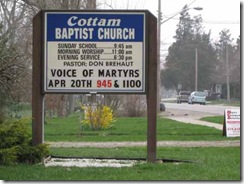 As reported in today's Persecution and Prayer Alert, in a ruling released late last week, the Ontario Human Rights Commission declared that Christian Horizons, an evangelical Christian organization that provides care and residential services to 1,400 developmentally disabled individuals, was wrong to require that its employees sign a lifestyle and morality statement as a condition of employment and ordered that it "cease and desist" from doing so. The lifestyle and morality statement prohibits behaviours Christian Horizons believes are prohibited for Christians including "homosexual relationships," "extra-marital sexual relationships (adultery)," "pre-marital sexual relationships (fornication)," "viewing or reading pornographic material," "endorsing" alcohol or cigarettes and "lying." This kind of code is quite common among faith-based organizations. The Voice of the Martyrs has one that we require our staff to sign annually.
As reported in today's Persecution and Prayer Alert, in a ruling released late last week, the Ontario Human Rights Commission declared that Christian Horizons, an evangelical Christian organization that provides care and residential services to 1,400 developmentally disabled individuals, was wrong to require that its employees sign a lifestyle and morality statement as a condition of employment and ordered that it "cease and desist" from doing so. The lifestyle and morality statement prohibits behaviours Christian Horizons believes are prohibited for Christians including "homosexual relationships," "extra-marital sexual relationships (adultery)," "pre-marital sexual relationships (fornication)," "viewing or reading pornographic material," "endorsing" alcohol or cigarettes and "lying." This kind of code is quite common among faith-based organizations. The Voice of the Martyrs has one that we require our staff to sign annually.
Boasting that it's ruling "has a significant impact for faith-based organizations that provide services to the general public," the OHRC ordered Christian Horizons to pay Connie Heintz (39) two years' wages and benefits, plus $23,000 in compensatory damages because from a complaint brought by Ms Heintz claiming that she was forced from the organization when she made it public that she was a lesbian. Heintz (39) willingly signed Christian Horizons' "lifestyle and morality" employee code when she joined the organization in 1995. By all reports, she agreed with it fully at the time. In 2000, however, she made it known to the organization that she was a lesbian, Heintz was offered counselling in her evangelical tradition to assist her in determining whether she could return to compliance with the basic requirements of her employment. Instead, she resigned, filing a human rights complaint four months later.
As we noted, contrary to what many are claiming, the OHRC ruled against Christian Horizons not on the grounds that the agency receives virtually all of its funding from the Ontario government (more than 75 million dollars annually) and, as such, is subject to the provincial human rights code. Rather, the ruling was because Christian Horizons' primary mission is to serve the public need for group homes for people with developmental difficulties. In a press release by the OHRC, Chief Commissioner Barbara Hall commented, "This decision is important because it sets out that when faith-based and other organizations move beyond serving the interests of their particular community to serving the general public, the rights of others, including employees, must be respected." The Tribunal also ruled that Christian Horizons must develop anti-discrimination policies, provide training to all employees and managers, and review all of its employment policies to ensure that they are in compliance with Ontario's Human Rights Code (click here to review the entire ruling).
As I read the ruling, it seems to me that had Christian Horizons limited its work to serving Christians that it likely would have won its case, despite receiving public funding from the government. But because Christian Horizons serves others outside of their faith community, they are now subject to the same restrictions as a secular organization. Don Hutchinson, General Legal Counsel and Director of Law and Public Policy with The Evangelical Fellowship of Canada rightfully asks in a National Post blog, "Imagine that Mother Theresa and her Missionaries of Charity had been told that their ministry in the streets of Calcutta was, in essence, not ministry but ‘social work.' In order for the sisters to continue in their work, they would no longer be permitted to require that staff members share their beliefs and ministry commitment." This is, in effect, the consequence of this ruling for Christian Horizons. They have been stripped of their right to operate as a faith-based organization simply because they chose not to limit the scope of their work to Christians.
Does anyone else find this outrageous?













